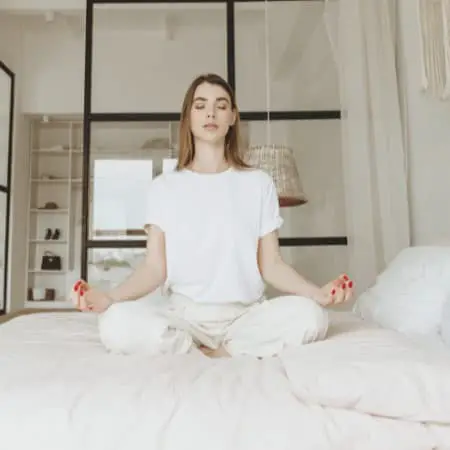If you have been meditating, you know the calm, relaxed feeling this practice can bless you with, as well as those side benefits it grants you, such as reduced stress and heightened awareness. And, if you have noticed certain similarities with what sleep does to your body and mind, you are not the only one. However, can meditation truly replace hours of precious sleep?
Meditation can’t replace sleep, but it can help you clear your mind, relax the body and improve your sleep quality. Practicing meditation regularly can also reduce the need for sleep. Ideally, you should meditate in the morning and go to sleep at a regular time, aiming for 7-8 hours of sleep.
Meditation might not replace sleep, but it can truly bring excellent benefits to your life and sleep quality. Find out about all this and more in the sections below.
Can Meditation Replace Sleep? All You Need to Know
If you have been practicing meditation, you know that it can make you feel lighter, calmer, and more relaxed. Depending on the type of meditation, you might also feel more aware of yourself and your surroundings and enjoy a greater ability to focus and concentrate.
Many meditators also report experiencing similar feelings and states of mind as they might get due to a good night’s sleep! And, of course, we have all heard of those practitioners who could meditate for days without needing sleep, food, or drinks.
While these facts might suggest that meditation can replace sleep, it cannot. Indeed, the body and mind’s physiological and chemical reactions during these two processes are incredibly different.
Undeniably, there is more than one link between sleep and meditation, but you should not attempt to replace one with the other. Generally, it is recommendable that you sleep an average of seven to nine hours per night – independently from your meditation practice!
Nonetheless, meditation can and will play an essential role in improving your sleep quality, the way you feel when you wake up, and the overall level of energy and focus you can sustain throughout the day. In some cases, such as for a nap or to make up for a short night’s sleep, you might use meditation to replenish your energy.
Meditation, Sleep, and the Circadian Rhythm
As we have seen, meditation cannot replace sleep. However, it can be incredibly beneficial to establish relaxation and clear the mind. In turn, this can translate into better night’s sleep and improved restfulness.

One of how meditation can help relates to its influence over the natural Circadian Rhythm. This rhythm is a 24-hour cycle that our bodies and minds go through every day. IT represents the body’s internal clock and regulates many of the fundamental functions the body relies on.
The Circadian Rhythm is composed of many aspects. However, one of the most important ones refers to the balance between sleep and waking hours. The cycle is directly tied with the hours of daytime and nighttime and can significantly influence sleep quality.
When the Circadian Rhythm is thrown off, many problems related to our stress response, productivity, and sleep can arise. These often include issues such as insomnia and mental-health-related conditions.
If your Circadian Rhythm is out of balance, you can reestablish it by working towards a steadier sleep pattern. Always going to bed and waking up at the same time while allowing for seven to nine hours of sleep can help you find your balance.
In all this, meditation can be a tool to help you restore your natural sleep pattern. For example, meditation can help you fight stress and anxiety, which are often responsible for poor sleep and cause sleep deprivation. If you have missed out on your night’s sleep, you will likely notice consequences such as tiredness and lack of focus during the day, creating a pattern of poor sleep and daytime health.
Meditation can keep stress at bay, helping you raise awareness of your emotions, body, and mind. Through steady practice, you can better understand how you react to stressors, allowing you to better control your responses. Through all this, you can improve the quality of life during the day and start working towards a more restful sleep.
Meditation and Sleep Are Unique
When trying to understand the effects that meditation and sleep have on our bodies, it is crucial to keep in mind that both are unique and extremely personal.
When sleeping, you will be aiming to replenish your energy and rest your body. However, not all night’s sleep will be the same, and even the one you consider a great night’s sleep might not be so good for someone else.
In the same way, no two meditation practices are the same. You might have thoughts flowing through that were not there during your yesterday’s practice. Or, you might still be training your body and mind to achieve a more profound sense of relaxation.
Therefore, when assessing how long your night’s sleep or meditation sessions should be, it is crucial to evaluate your body and mind. Understand if you feel tired when you wake up and whether you need caffeine to get you through the day. Analyze the level of energy you can count on during the day or while at work.
If you feel tired throughout the day after having slept seven hours, make sure you increase the time you spend sleeping. You might also decide to practice meditation to improve the quality of sleep during the seven hours available to you.
Instead, for another person, seven hours of sleep might be plenty, and a quick meditation session at lunchtime can offer the focus needed to make it through the rest of the day.
Unfortunately, there is no fast answer you can rely on when trying to identify a routine that works.
As a general rule of thumb, you should:
- Establish your Circadian Rhythm by going to sleep and waking up at the same time
- Eat healthily
- Exercise regularly
- Practice meditation and mindfulness throughout the day
What Happens When You Replace Sleep With Meditation?
We are all aware, to an extent, of the consequences that low sleep quality can bring into our lives. We might feel tired, more irritable, and losing the ability to stay focused. However, in the long run, these consequences can get significantly worse. Indeed, they can result in physical and mental health problems.
It might even be suitable for you to substitute 20 to 30 minutes of sleep with a meditation session. Indeed, this might offer you the calm and clarity of mind your body needs to grant you a great night’s sleep.
However, meditation cannot replace sleep entirely or for more significant windows of time. Indeed, meditation and sleep trigger diverse reactions in the brain and the body, making them both irreplaceable. Substituting meditation to sleep will invariably cause you to suffer from sleep deprivation in the long term.
To understand why one is not replaceable with the other one, let’s look at what happens to our body below.
What Happens in Our Mind When We Meditate
Meditation is a practice that can help us find a state of deep relaxation, calm, and self-awareness. Each practice is utterly unique, and it can be practiced everywhere – as far as there is a comfortable place where you won’t be disturbed. There are over 12 types of meditation you can leverage and explore, and they all focus on breathing as a vital force.

Depending on the kind of meditation or guided meditation you are practicing, you might feel calmer, energized, relaxed, or sleepy after a session. The way you feel after a meditation practice represents the first significant difference between meditation and sleep.
Indeed, no matter how long you sleep, you are likely to feel groggy, tired, a little slow in the morning – at least until your morning routine kicks in or some coffee helps you get up!
With meditation, the feel-good feeling is instant because this practice causes your body to release endorphins, alongside other feel-good chemicals such as melatonin, serotonin, and dopamine.
Additionally, it is worth considering the amount of oxygen you take while meditating. The practice is all about increasing oxygen flow, taking deeper breaths, and inhaling and relaxing the body. Depending on what type of meditation you have been practicing, it is also possible for you to practice breathing into certain parts of your body to relax the muscles and ease any pains or discomfort.
At the same time, because the body and mind are at rest, our bodies don’t need as much oxygen to function. That is how many expert meditators can significantly lower their oxygen intake and heart rate when meditating.
Another substantial difference between meditating and sleeping is the level of consciousness you can achieve during the two activities. While meditating, we benefit from a heightened awareness of our conscious (thinking) mind and subconscious (deep thinking) mind.
We can tap into our creativity, calm, strength, intuition, and higher intelligence in this state. This process of unlocking such potential also happens during sleep. However, when meditating, you are awake and ready to reap the benefits of cush practice!
What Happens in Our Mind When We Sleep
When we are asleep, our bodies and minds follow a 4-stage cycle that will last between 70 to 120 minutes each and repeat itself several times throughout a night’s sleep of seven to nine hours.
The significant phases of the human sleep cycle are divided into non-REM and REM (Rapid Eye Movement) and are:
- Non-REM (light sleep) – During this phase, your body is slowing down and preparing to enter deeper sleep cycle stages. It only lasts around 7 minutes.
- Non-REM – During stage 2, the whole body relaxes, your breathing slows down, and your temperature decreases. This phase is the longest-lasting one.
- Non-REM (deep sleep) – This phase is the one during which the body enters complete stillness, and it has the chance to rest, repair damaged cells, and replenish energy.
- REM phase – This phase is characterized by Rapid Eye Movement and dreams.
Other significant changes that occur during the time we are asleep include the flow of oxygen our body receives. During sleep, our breathing becomes slower and often more profound. We don’t have control over our breathing and heart rate during sleep.
One of the similarities between sleep and meditation is that you will be able to tap into both the conscious and subconscious mind in both cases. However, unlike during your meditation practice, you will be asleep while this happens, so you can’t reap the benefits of this experience!
Ultimately, sleep is vital. It allows us to feel rested and energized during the day, and it helps our body keep the immune system healthy and illnesses at bay. However, meditation is also a crucial component of a healthy lifestyle. Indeed, this practice can help you better understand your behavior, feelings, and responses, leading to a more successful and balanced life.
Why Do We Fall Asleep While Meditating?
Falling asleep while meditating is extremely common, and it is something that most beginners have to deal with. The fact that we sometimes fall asleep during a particularly intense meditation session is proof of the deep connection between meditation and sleep!
It often happens because it can be challenging to balance focus, relaxation, and awareness. This type of balance is what a more profound, more regular practice will bring you.
Nonetheless, it is also worth mentioning that there is a phase during your meditation practice, referred to as the 4th stage of consciousness or Turiya. During this phase, you left, and the right parts of the brain are in harmony, and they allow your mind to obtain heightened awareness. At the same time, your body is completely relaxed, which might give the impression that you have fallen asleep.
You can find out about this connection in the video below:
The Relationship Between Meditation and Sleep
While meditation cannot replace sleep, the activities are much more connected than we tend to realize. Indeed, meditation can grant you better sleep. In contrast, a good night’s sleep can offer you the mental clarity and physical energy to approach your next meditation session (as well as many other aspects of your daily life!).
But how exactly can meditation benefit sleep? There are several connections between the two practices, and the way meditation can clear and relax the mind is something that not many other techniques can compete with.
In the sections below, you will find all the benefits that meditation can bring to your sleep. However, you will also find the downsides of this practice that can show in certain particular cases.
Meditation Can Relieve Insomnia
Chronic insomnia is a condition that affects over 30% of the population, and a significant number of people also experience it at some point during their lifetime, usually following certain impactful events.
Chronic insomnia can significantly affect sleep quality and the ability to rest the mind and body.
However, it often leads to even more severe health conditions, including:

- Depression
- Anxiety
- Poor memory
- High-stress levels
- Reduced concentration and focus abilities
- Irritation
- Increased inflammation
Because of the several adverse effects that insomnia can bring into your life, many patients have started to approach meditation. Indeed, meditation presents itself as a low-risk, highly accessible solution that does not require medical treatments to work.
Studies have found that meditation can help treat insomnia symptoms and even reduce the lasting daytime disturbance that might come from it. A 2010 research shows how the results that can be seen through mindfulness are comparable to those seen through sleep medication.
And, meditation also works similarly to those medical treatments for insomnia: it aims to relieve the stressors and pressure that interfere with sleep. It does so by bringing you to a relaxed state, which can help you fall asleep. Through meditation, you can allow your brain to unwire and let go of factors such as stress and anxiety – which are those that get in the way of a good night’s sleep.
Meditation Can Reduce Stress
As seen above, meditation reduces stress. It does so by bringing you to a state of acceptance and awareness – a condition in which we don’t find ourselves very often during our daily lives. During your meditation session, you will learn to focus uniquely on the breath, which will take your mind off rumination and tumultuous emotions.
For example, it has been seen that mindfulness-based meditation can help reduce sleep problems in patients dealing with fibromyalgia. Indeed, this practice helps them better manage negative feelings and states, including anger, anxiety, and depression.
Breathing Can Improve Body Relaxation
As we have seen, meditation can have significant benefits in your mind. However, it can also be extremely positive for your body. Indeed, the practice of meditation can help the body get ready for sleep by changing the reactions happening in the nervous system.
It is also worth considering the effects that consistent mindfulness practice can cause at a biological level. While meditating, your heart rate will slow down, alongside your breathing rhythm. These changes happen because your body does not require as much oxygen or energy to remain conscious and aware while in a meditative phase.
At the same time, a 2020 study shows that the stress hormone (cortisol) levels are lowered through meditative practice. In turn, the low levels of cortisol reduce inflammation, improve insulin resistance, and prevent oxidative stress.
Meditation Might Reduce the Need for Sleep

When practicing meditation to improve sleep, you will need to practice steadily and consistently. Indeed, it has been seen that meditation can cause long-lasting changes and improve the non-REM phases of sleep in the long term.
Because such non-REM stages are those in which the body gets the highest rest and relaxation level, you will feel more energized and rested in the morning.
So, once you have obtained a better night’s sleep, you might find out that you don’t need as many hours in bed. Indeed, you might start feeling much more refreshed and energized just after seven hours instead of nine.
Of course, this doesn’t mean that meditation is a substitute for sleep. It only means that, when practicing meditation, your body will require fewer hours of sleep to recharge batteries.
If you wish to find out whether this benefit is something you can count on, you might consider working on reestablishing your Circadian Rhythm. Then, introduce meditation. This strategy is the most natural way for your body to obtain the rest it needs – naturally!
Meditation Can Help You Deal With Tiredness
Meditation might substitute your power nap. Indeed, several practitioners have found that meditation can cause you to increase your focus and concentration instead of sleep. Indeed, if you are looking for a quick way to recharge your energy and focus, opting for meditation instead of a nap can offer you all the benefits of mindfulness, without the need to feel tired and groggy.
The Downsides of Meditation for Sleep
Generally, meditation is a safe, low-risk, and drug-free practice that allows you to tap into heightened awareness, relaxation, and wellbeing. However, just like any other practice or treatment, it might not be suitable for everybody. All this is especially true when you are using meditation to improve your sleep quality.
You might be able to find out whether this practice is suitable for you by understanding the reasons behind your poor sleep. Here are some of the downsides of meditation before going to sleep or with the intent of improving sleep quality:
- It might bring up painful or worrisome memories and thoughts
- It might steer your emotions, making certain feelings come up
- It can lead to paranoia
- It might lead you to have a distorted perception of reality and events
- It might cause you to feel disconnected from your surroundings
- It can cause some frustrations to arise
These are some downsides that some practitioners might experience when practicing meditation. While for many, they represent a natural consequence of their practice, some other individuals might react differently to such powerful stimuli.
In this case, such emotions and thoughts might interfere even more with your sleep rather than improve it.
Types of Meditation to Improve Sleep
There are several types of mindfulness-based meditation techniques that can help you improve your sleep quality. The one to pick depends on what you are trying to achieve and what time of the day you practice.
For example, if you wish to reduce physical pain, you might opt for a body scan. Oppositely, you might pick a restorative yoga session to stretch your body before sleep. Or, you might just stick to breathing exercises to practice in bed.
Additionally, depending on the kind of practice you opt for, you might pick different times of the day to introduce it into your routine.
Try a Body Scan
Body scan meditation is undoubtedly one of the best techniques when you are looking at relaxing your body. This practice does not primarily focus on your breath and, because of this, it can be safely practiced before bed.
Indeed, during a body scan, your mind will be focusing on the different body parts and components, intending to relax them and relieve pain. Because of the way your mind is focused, there will be limited space for upsetting thoughts. You can also practice a body scan meditation while in bed or before sleeping.
Always Do Breathing Exercises
Pranayama – also known as breathing exercises – is a fundamental aspect of the yoga practice. Pranayama can be done simply by taking in deep inhales and letting our long exhales. However, you might also use specific techniques such as Alternate Nostril Breathing or Ujjayi breathing.
These practices help oxygenate the organs, cool the body, and relax every muscle. In turn, you will see beneficial effects on your sleep quality, blood pressure, and even cognitive abilities.
You can practice Pranayama throughout the day, whenever you feel like your body requires more profound relaxation or wish to gain better control over the present moment.
Use Visualization Techniques
Visualization meditation can also be done throughout the day, but it is more recommendable to perform it in the morning. Visualization techniques require you to focus on a particular event, person, or course of events.
This exercise will allow you to visualize yourself in a situation that scares you or intimidate you. You can then determine the way these events go. For example, you visualize yourself looking confident and at ease while delivering that presentation! This type of exercise can then help you better deal with the situation when it comes around.
Move Your Body With Restorative or Yin Yoga
Lastly, don’t underestimate the power of moving your body as a form of meditation. You can use restorative or yin yoga techniques to find a relaxing sequence that will help you stretch and balance your muscles before sleep.
Conclusion
Ultimately, meditation cannot replace sleep. Indeed, both activities bring essential benefits to your life, and our bodies cannot do without them. Sleep will bring you body relaxation and physical rest, but mostly when your mind is at ease.
Instead, meditation has a more significant effect when you are looking for a way to clear your mind, relax your body, and return to your breath. The two practices are essential and interconnected, and they can influence each other. In particular, meditation has been seen to be particularly beneficial when it comes down to improving sleep quality.








